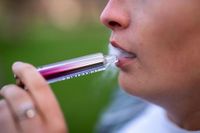On Sunday, June 1, 2025, the United Kingdom implemented a sweeping ban on the sale of disposable vapes, marking a significant step in the government's efforts to tackle rising youth nicotine addiction and the mounting environmental hazards posed by single-use vaping devices.
The ban prohibits all retailers—whether brick-and-mortar shops, online vendors, or wholesalers—from selling disposable vapes, regardless of whether they contain nicotine. However, reusable vapes, which feature rechargeable batteries and refillable e-liquid containers, remain legal and available for purchase. This distinction is central to the government's strategy to reduce harm while offering alternatives to smokers seeking to quit combustible cigarettes.
Disposable vapes, also known as single-use vapes, are designed for short-term use. They come pre-filled and pre-charged, with batteries that cannot be recharged or replaced. Typically small and pocket-sized, these devices are activated by inhaling but have batteries that often last only a day or so, after which they are discarded. Unlike reusable vapes, they lack refillable tanks and removable coils, making recycling difficult and waste management problematic.
Environmental concerns were a driving force behind the ban. In 2023 and 2024, an estimated five million disposable vapes were discarded or littered each week across the UK, nearly quadrupling from previous years. According to the Department for Environment, Food and Rural Affairs (Defra), this surge contributed to an "avalanche of rubbish flooding the nation’s streets." The built-in lithium batteries in these devices pose significant fire risks in bin lorries and recycling facilities. Moreover, because disposable vapes must be dismantled by hand to recycle, many end up in general waste or as litter, leaking harmful chemicals into soil and waterways, potentially harming wildlife.
Nature minister Mary Creagh described single-use vapes as "extremely wasteful and blight our towns and cities," emphasizing the ban's role in combating the UK's "throwaway culture." Similarly, Minister Andrew Muir of Northern Ireland's Department for Agriculture, Environment and Rural Affairs (Daera) highlighted the environmental benefits of the ban, noting it would also reduce health risks and fire hazards.
Youth vaping rates have also been a major concern prompting the legislation. The introduction of a new generation of disposable vapes in 2021 coincided with a sharp rise in vaping among young people. These devices are relatively cheap, brightly colored, easy to use, and heavily marketed, making them particularly attractive to children and teenagers. NHS research indicates that about a quarter of children aged 11 to 15 have tried vaping, and according to then-health minister Andrew Gwynne, disposables are the "product of choice for the majority of kids vaping today." Action on Smoking and Health (ASH) reported 5.6 million adults vaped in Great Britain in 2024, highlighting the widespread use of these products.
Despite the ban, experts question its potential impact on reducing youth vaping. University College London's Dr. Sarah Jackson suggested the ban might have a "limited impact" on overall vaping rates, as users are likely to switch to reusable devices rather than quit entirely. Hazel Cheeseman, chief executive of ASH, echoed this skepticism, telling BBC Breakfast that "teenagers weren't drawn to these products because you could throw them away. They were drawn to them because they were brightly coloured, because they were cheap, and they were really, really available. All of those things will still be true on Sunday." This highlights the complexity of addressing youth nicotine addiction beyond just banning single-use products.
Anticipating the ban, many users and retailers rushed to stockpile disposable vapes. Online retailer Vape Club reported sales increases between 50% and 100% in the weeks leading up to June 1, with adult users seeking to maintain their smoke-free habits. Former smoker Cara Hallinan told the BBC she bought boxes of disposable vapes at discounted prices, and vape shop employee Jack Leadbeater observed customers bulk-buying to extend their supply post-ban. Baroness Claire Fox expressed her apprehension in the House of Lords, accusing the government of prioritizing environmental concerns over public health.
Compliance is mandatory for all businesses involved in the supply chain, including manufacturers, wholesalers, importers, retailers, healthcare settings, and stop smoking services. Rogue traders caught selling disposable vapes face an initial fine of £200 ($260), escalating to unlimited fines or even jail time for repeat offenses. In Northern Ireland, penalties are more severe, with offenders facing up to two years in prison and fines up to £5,000.
Asthma and Lung UK Northern Ireland policy officer Andrew Wilson welcomed the ban but urged the Northern Ireland Executive to leverage this momentum to create smoke- and vape-free places, especially in playgrounds, schools, and hospitals. He pointed to research linking vaping to airway inflammation, which can exacerbate conditions such as asthma and chronic obstructive pulmonary disease (COPD). Wilson also called for a new tobacco control strategy and for Northern Ireland to publicly commit to smoke-free targets, aligning with other parts of the British Isles.
Meanwhile, Paul Lagan, owner of a chain of vape shops in Belfast, supports the environmental benefits of the ban but voiced concerns over an impending vaping tax scheduled for 2026. This tax would add £2.20 to every 10ml bottle of e-liquid for reusable vapes, potentially doubling costs and affecting users' choices. Lagan suggested that licensing vape shops could help prevent youth access and warned that banning certain flavors might inadvertently fuel a black market.
Public opinion varies, with some young people like Darragh McKay supporting the ban due to the bright colors and appeal of disposable vapes to children, while endorsing refillable vapes as effective smoking cessation aids. Alison Nic Craith, who does not vape, praised the legislation for protecting youth and emphasized the need for stricter ID checks in shops. Vape user Auron Cull, who hopes to quit, agreed with the ban, noting the prevalence of vaping among schoolchildren. Non-vapers like John Watson support the ban for environmental reasons but recognize the convenience of disposables, which has led some to stockpile them.
The Public Health Agency’s research found that 46% of Year 14 school pupils surveyed currently vape, despite sales to under-18s being illegal. Colette Rogers, strategic lead for tobacco control at the agency, urged parents and carers to use the ban as an opportunity to discourage youth vaping and prevent vapes from falling into minors' hands.
Looking ahead, the UK government is also considering further legislation to restrict the packaging, marketing, and flavors of e-cigarettes under the Tobacco and Vapes Bill. This bill would ban tobacco products for anyone born after January 1, 2009, and tighten controls on vaping products to address both public health and environmental concerns.
While vaping is not risk-free, NHS guidance acknowledges it poses a much smaller risk than smoking cigarettes, lacking harmful tar and carbon monoxide. Evidence suggests vapers are twice as likely to quit smoking compared to those using other nicotine replacement therapies. However, the long-term health effects of vaping remain uncertain, given its relatively recent emergence.
As the UK embarks on this new chapter in tobacco and vape regulation, the ban on disposable vapes represents a bold attempt to curb youth nicotine addiction and environmental damage. Whether it will achieve its goals remains to be seen, but with ongoing debates and evolving policies, the nation’s approach to vaping is clearly at a pivotal moment.



